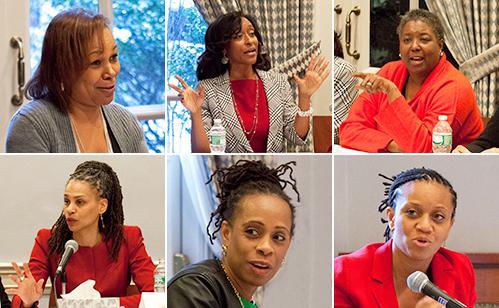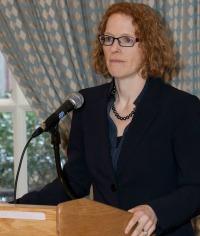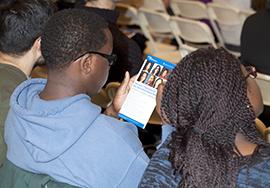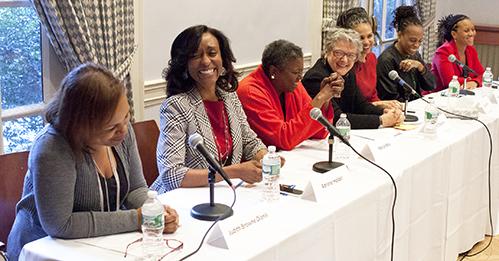Toward Justice for All
Prominent Columbia Law School Alumnae Working to Improve Race Relations and Eliminate Inequality Discuss Their Roles as Leaders, as Women of Color, and as Change Agents
New York, March 13, 2015—Six Columbia Law School alumnae working at the leading edge of efforts to eradicate systemic racism, inequality, and poverty in New York City and beyond returned to Morningside Heights on Feb. 23 to discuss their pioneering public interest law careers.
The women said their work requires creativity, determination, and critical legal thinking. It also requires community building and the support of allies, something the women learned when their paths overlapped at Columbia Law School where they tapped into a close-knit community of faculty and graduates engaged in social justice issues.
“We are a resource, and we will always be there for one another,” said Sheena Wright ’94, of her fellow panelists and other alumni who advocate for change, including future graduates.
Wright, the president and chief executive officer of United Way of New York City, was joined in the discussion by Judith Browne Dianis ’92, co-director of Advancement Project; Adriene Holder ’91; attorney-in-charge of the civil practice at The Legal Aid Society of New York; Marcia Sells ’84, associate vice president for government and community affairs at Columbia University; Maya Wiley ’89, counsel to NYC Mayor Bill de Blasio; and Anne Williams-Isom ’91, chief executive officer of the Harlem Children’s Zone.
| (Clockwise from top left) Judith Browne Dianis '92, Adriene Holder '91, Marcia Sells '84, Sheena Wright '94, Anne Williams-Isom '91, and Maya Wiley '89 returned to campus recently for a candid discussion of their careers in social justice and advocacy and their experiences as women of color. |
The panelists talked candidly and with great enthusiasm about career paths, mentors, challenges they have faced as women of color, and their views on the value of legal training for those who wish to create change in the world. The event, “Toward Justice: A Conversation with Public Interest African American Alumnae,” was hosted by Social Justice Initiatives in collaboration with the Black Law Students Association and Empowering Women of Color student groups and also featured a Q&A with attendees.
“Black Lives Matter”
The conversation was held in part to commemorate Black History Month. But it was all the more timely because it came in the midst of a nationwide call to ensure “Black Lives Matter,” a campaign launched after the two grand jury non-indictments in the police shooting deaths of Michael Brown and Eric Garner in Ferguson, Missouri, and Staten Island, New York, respectively. Columbia Law School Dean and Lucy G. Moses Professor of Law Gillian Lester, who along with Dean for Social Justice Initiatives Ellen P. Chapnick made introductory remarks at the event, acknowledged the impact the non-indictments had, both within the Law School community and society at large.
| Dean Gillian Lester offered opening remarks at the event, which she said would be the start of a "guided conversation" about how to address problems like structural racism. |
“Many of us went to law school because we wanted to advance the cause of social justice, and it seemed that the law would be a potent tool,” Dean Lester said. “But the events of last fall led many to question their faith in the law as a transformative tool.”
Dean Lester said the discussion with some of the Law School’s most accomplished alumnae—whom she called “a formidable group”—would serve as the start of “a guided conversation” about how to address social problems including structural racism.
Chapnick agreed.
“I hope this contribution to Columbia Law School’s commemoration of Black History Month will help us think not only about history but about the present and where we want to be in the future,” she said.
In Pursuit of Justice
Each of the panelists had plenty to say, and their respect and affection for one another as classmates and colleagues was evident throughout the evening. Answering questions from Chapnick, who served as moderator, they shared details about their formative years, including—for some of the women—growing up with activist parents. They emphasized the skills they acquired at the Law School, especially through participation in clinics, and the current and former faculty who inspired them and supported them in public interest work, including Conrad Johnson, Mary Marsh Zulack, Jane M. Spinak, Kendall Thomas, Jack Greenberg ’48, the late Kellis E. Parker, and the late Julius Chambers ’64 LL.M.
They also talked about why they decided to pursue social justice work.
“I wanted to make sure that the world knew that people who looked like me or were low income were not invisible,” said Holder, who cited as one of her heroes Constance Baker Motley ’46, a civil rights activist and the first African American woman appointed to the federal bench.
Wiley said she learned about activism in part from her father who helped organize women on welfare. Many activists at the time wore buttons that said, “I am not a lawyer!” The perception among the community, Wiley said, was that lawyers “told activists what they could not do.” She wanted to change that perception.
“I knew there was a way to be a lawyer that would not prompt activists to wear those buttons,” she said.
Looking Back at Law School
In addition to their legal advocacy, the panelists discussed the early roots of their activism, including on campus. In 1989, Columbia Law School offered the nation’s first-ever AIDS discrimination clinic, which was very popular among students because it provided the opportunity to provide direct services to the community on an important issue of the day. Wiley explained that when she and other students heard that the clinic would not be continued, they protested the decision. They also protested to advocate for a more diverse faculty and student body, including by staging a sit-in at the office of then-Dean Barbara Aronstein Black ’55.
“Was that the first or second takeover?” asked Sells. The numbers caught Dean Lester’s attention.
“Wait, how many takeovers are we talking about?” she joked from the audience, prompting laughter throughout the room.
In part as a result of the students’ advocacy, Columbia Law School made a significant effort to diversify its community.
Guidance for the Next Generation
The alumnae also offered advice to the young law students in attendance, saying there is an urgent need to build political, social, and economic strength within disenfranchised communities.
| Columbia Law School students and alumni had the chance to ask questions of each of the alumnae speakers. |
“Our fight at this moment is about building power,” said Dianis. “How do we make sure young people are getting to a point where they can change the system in front of them?”
Holder said attorneys have to be creative in thinking about ways to make change.
“It’s not just litigation,” she said, describing cases her staff have lost but then used as leverage to achieve results. “Sometimes you have to build bridges where you don’t think there are any.”
Isom, whose work involves ensuring children have access to an education, agreed that society must do better for those in need.
“It’s not the kids,” who are failing, she said. “We are the ones who can’t think boldly enough.”
Breaking Barriers
Chapnick asked the panelists to reflect on instances when they have been made to feel like “intruders” because they are women or, more specifically, women of color. The list was long. The women talked of being required to wear skirts at law firms, being mistaken for witnesses in court, and having to listen to discriminatory remarks in conversations with colleagues. Each has been a pioneer in her career in some way, including Wright, who is the first woman to lead the United Way of New York City and was the second black woman at her law firm; and Sells, who was one of the first black women at the district attorney’s office where she began her career and the first black woman at the firm she later joined.
But the panelists cast aside those experiences as external, saying women of color must focus on their own role and work in the world.
“I am not the intruder,” Dianis said. “The people who don’t get what we do are the intruders.”
Wright said the experience of being a black woman is valuable in that it requires “grit and resistance” to overcome obstacles.
“Being a woman and being black makes me stronger and better,” she said.
Wiley also emphasized the importance of internal resources but said being successful requires more than belief.
“I have never experienced any job where I wasn’t treated as an intruder,” she said. “I operate under the assumption that it will happen.”
She added that she prefers to confront discrimination head on, but that she also knows when situations call for a more subtle response, such as marshaling allies to make the case for change in a different way or from outside an organization.
“You need a strategy,” she said. “Don’t ever make the mistake of thinking you don’t.”
After the discussion and Q&A, the panelists and attendees enjoyed a reception, reminiscing with each other and faculty members about their Columbia Law School experience and chatting with students.
Chapnick commented on the strong bond between the women. She said they were proof positive of the communal nature of public interest work.
“We don’t have to hunker down and do justice alone,” she said.
| Most of the women were in overlapping classes at the Law School. Their affection and respect for each other and for moderator and Dean for Social Justice Initiatives Ellen Chapnick was apparent throughout the program. |



